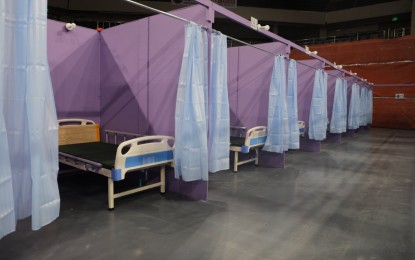
Patient care center (File photo)
MANILA – The government can wield its inherent police power to bring individuals who acquire the coronavirus disease 2019 (Covid-19) to isolation facilities, Malacañang said on Wednesday.
Presidential Spokesperson Harry Roque made the remarks in an interview with ABS-CBN News Channel, as he emphasized the need to isolate Covid-19 patients who are asymptomatic or have mild symptoms in a bid to stop the further spread of the novel coronavirus in the country.
“If there is a communicable disease and if they refuse to be isolated, the state of course can isolate them,” Roque said. “There’s inherent police power that is very essential to the establishment of the state. And if it is to protect public health, I think the isolation can be justified.”
Roque’s statement came a day after Interior Secretary Eduardo Año said the government will conduct “house-to-house” searches for Covid-19 patients to prevent wider community transmission of the new coronavirus.
The government’s tougher approach was imposed amid soaring Covid-19 cases in the country.
Año said the Philippine National Police and local government units would be tapped to conduct the house-to-house screening.
Año explained that the latest development was in line with the implementation of “Oplan Kalinga” programs, which aims to transfer Covid-19 patients to temporary isolation facilities.
Roque clarified that the government would not use force against infected individuals who are not qualified to undergo home quarantine.
He said the house where an individual who contracted Covid-19 is staying will only be visited, once the government receives report from either the infected person, his family, or a village official.
“We prefer that asymptomatic and the mild cases voluntarily surrender and confine themselves in isolation centers,” Roque said.
Roque, nevertheless, said individuals infected with Covid-19 can still undergo home quarantine, so long as they have their own room and own toilet.
He added that home quarantine is still allowed among Covid-19 patients, provided that they do not live with individuals with comorbidities, senior citizens and pregnant women.
“There’s no other way. Let me make this very clear. The legal basis to bring the asymptomatic and the mild cases without any isolation facilities or with vulnerable [people] still living with them is still the inherent power of the state. It’s still promotion of public health,” Roque said.
Containing the virus
Roque said there is a need to intensify the fight against Covid-19, considering that the World Health Organization (WHO) took note of the Philippines’ “weak” contact tracing efforts.
Dr. Rabindra Abeyasinghe, WHO representative in the country, noted that while the Philippines was able to improve its testing capacity and expand its treatment capacity, its contact tracing and ways of stopping the spread of Covid-19 are a “little weak.”
Roque agreed that the government still needs to intensify its contact tracing efforts.
“I think that is where WHO is correct, the fact that we have not filled up our isolation facilities. We have only filled up up to 40 [percent] to 50 percent of our isolation facilities because we have actually been very tolerant of individuals staying home and [undergoing quarantine] even if we are not sure if they have the proper isolation facilities,” he said.
He said isolating individuals infected with Covid-19 would help the government curb the spread of the disease.
“It’s imperative that those who are positive, if they don’t have their own isolation capacity in their homes, move to an isolation center because that’s the only way we can contain community transmission of the virus,” Roque said.
As of July 14, the Philippines has reported 57,545 Covid-19 infections, with 20,459 recoveries and 1,603 deaths. (PNA)
